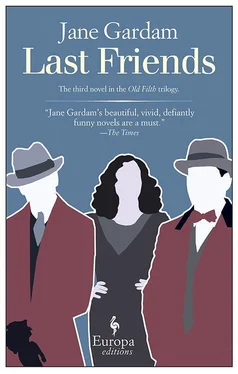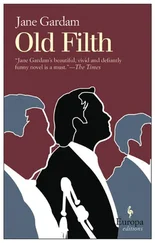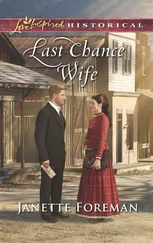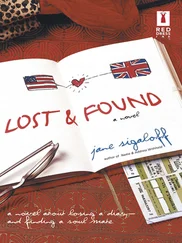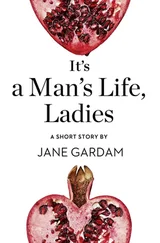Veneering’s pale fist had clenched and cracked into the monster’s jaw. Both men fell sideways and began to shout and yell.
Away over at the rose-pink palace some Germans were being shown round by an estate agent. They called out. One of the Germans looked through his enormous binoculars and said ‘It seems to be two old men fighting. It looks like a fight to the death.’
Across the seaside tundra there came a snapping sound and the thin old man with streaks in what had once been golden hair was lying still, one leg apparently missing. It had invaded the terrifying opening in the cliff from which the fresh water poured into the ocean.
‘Locally it is called the water of life,’ said the estate agent, but when they reached the two combatants this did not seem apt. Veneering’s ankle was broken, his foot hung limp and he had passed out. He came round only briefly when mobile phones had summoned help and he was being carried off on a stretcher towards the hospital. Before he died, after a thrombosis had set in, he told the would-be barrister’s clerk that he wasn’t having one word said, ever, against Elizabeth.
* * *
When Old Filth heard the news he said, ‘Silly old fool. Off on a jaunt like that at his age. I’d not have gone with him even if he’d asked me.’
Then Filth sat out the long day and the evening in Donhead St. Ague, listening to the rain, not looking up behind him at Veneering’s darkened house, not bothering with whisky or the television news or the supper left out for him in the kitchen. He sat on and on in the mid-winter dark.
When a post-card from Veneering arrived — written his first evening in the tomb-like hotel — Filth read how happy he was now with no desire to come home.
‘So he did get to heaven, then,’ said Old Filth to his wife’s photograph on the mantelpiece and Betty’s young face smiled back at him from another world.
In Donhead St. Ague half-a-century on the family man and poet, hard at work clearing Veneering’s attic, his wife Anna cooking and laundering for her burgeoning bed-and-breakfast business, their children at school, their cat with activity of its own. A raw cold day and nothing in the village stirring. The family man appeared in the doorway of the ironing-place holding a battered photograph.
It is of a lipsticky young woman with bouffant hair. The photograph has been stuck long ago on cardboard and its margins covered with kisses.
‘Veneering again,’ he says. ‘I wonder which this one was? I’d guess it isn’t Betty Feathers.’ She takes it and turns it over. She reads, ‘From Daisy Flagg with love and gratitude.’
‘Isn’t she lovely?’ says Henry, the family man (and poet). ‘Like a juicy fruit.’
‘But she’s not his floozy,’ says Anna. ‘My head on the block, she’s not. I wonder what he did for her. That’s a fine fur coat. I’d guess a secretary of some sort. Adoration in the eyes. I’ll take it round to Dulcie. I expect she’ll know.’
But they forgot, and the photograph was put aside on a window-sill and then upon a pile of books and then tossed in the rubbish collection. A week later Anna yells at Henry to take the rubbish to the gate before he leaves for a Poetry Festival next day and he sees the photograph again and stands in contemplation. He says, ‘Anna — all this stuff in the attic and there’s not a sign of Betty Feathers anywhere. Not a letter. Not a post-card.’
‘Men are like that,’ she says. ‘I don’t expect her husband kept anything of hers either. It’s women who press flowers in books. Keep letters.’
‘Do you? Will you?’
‘No. Because I’ve got you.’
‘Don’t be so sure. I might run off with Dulcie.’
* * *
Then he left the photograph on the kitchen table and went off to the tip. When he came back he said, ‘We haven’t actually seen Dulcie lately. Go and show her this while I’m away.’
‘Isn’t she on a cruise?’
‘Oh, we’d have heard. Janice would have told us.’
‘Janice is on holiday. Two — no three — weeks. D’you know, I don’t think we’ve seen Dulcie since that day the cat went mad. I’d better go round. She’ll be on her own. The dismal daughter is back in America with the eccentric yoof.’
‘Go tomorrow after I’ve left. The sole of my shoe’s hanging off. You’re better at sticking it back on. And I’ve not finished my lecture.’
‘Sorry,’ said Anna, ‘There’s glue somewhere in a box. I’m going to Dulcie now .’
* * *
And she knocked and rang, although both the kitchen door and the front door of Privilege House stood open. She walked in, stood in the quiet hall and called, ‘Dulcie.’
Deep silence. Her neck prickled. The house felt cold, unoccupied. In the kitchen, a slowly-dripping tap. Everywhere empty of life.
In Dulcie’s bedroom her bed was un-made and the floor strewn with old clothes, probably sorted for a charity. Looking again Anna saw the crumpled expensive wool suit and the black funeral hat. There were some tiny antique corsets. White cotton stockings like Victorian fashion plates. However old is she? Are these menstrual rags? Virginia Woolf used menstrual rags. She only died in 1941. Dulcie must have been planning a fire like the cremations on the ghats of the Ganges.
And she is gone.
Then through the open door at the end of the landing she saw Dulcie’s child-like back, very upright at a writing-desk that faced the fields and empty sky. She appeared to be writing letters. Thick yellow paper around her feet was crumpled into balls.
‘Dulcie! Good heavens!’
She waited for the little figure to keel over sideways from the current of air disturbed by her voice; to slide to the floor. Dead for weeks.
‘Yes?’
‘Dulcie! You’re freezing up here. What are you doing? We thought you’d gone on a cruise.’
Dulcie shivered and tore up another letter but kept it tight in her fist, staring ahead.
‘You are — Dulcie, you are not still writing to Fiscal-Smith!’
‘Trying to. He hasn’t answered any of them the past weeks. He doesn’t seem to be on the phone or have this e-mail thing. Neither do I. Nearly a month and no thank-you letter. It’s unheard of. And this great pink chair has come for him. Wrapped in tarpaulin. It’s not that I want to see him, it’s just so out-of-character. When a friend of sixty years begins to act out-of-character you begin to wonder if you might never. . There’s nobody up there — it’s called Lone Hall — to contact. I don’t think it’s anywhere near a police-station. . ’
‘Oh, I’m sure we can find it.’
‘Anna, I was very cruel to him. I let him know that we had always thought him mean and grasping. All his life he’s been longing for company and nobody has wanted him because he’s, well, so awful, really. So disgracefully conceited. Clever of course. Efficient. But withdrawn and obscure. But — oh Anna! — he’s always been there . He has no charm and he knows it. Can’t connect. Can’t hear people thinking. Can’t help being what he is. He knows that nobody ever liked him. Haven’t I a duty to him, Anna?’
‘Certainly not!’
‘But I do . He’s broken the pattern. The cracks will spread. They’ll spread across all our crumbling lives, the few of us who are left.’
‘Oh, come on, Dulcie.’
‘He’s disappeared, Anna. It isn’t senility, Anna, and it isn’t spite or resentment because we’ve laughed at him all these years. It’s simple, determined rejection of us, of the very, very few last friends. Where is he, Anna?’
‘Come home with me. We’ll find out. Get your things — not the ones on the floor — and stay the night. I’m not leaving you here alone. You’ve got no tights on. No shoes. Your feet are navy blue.’
Читать дальше
